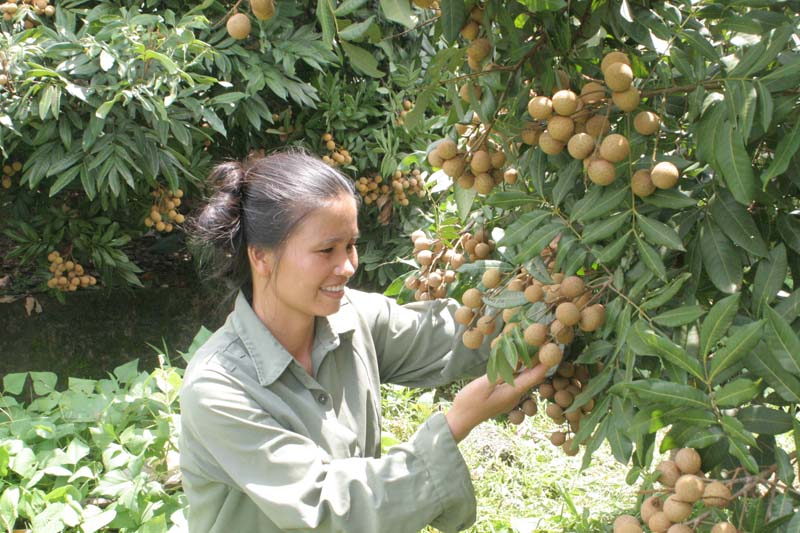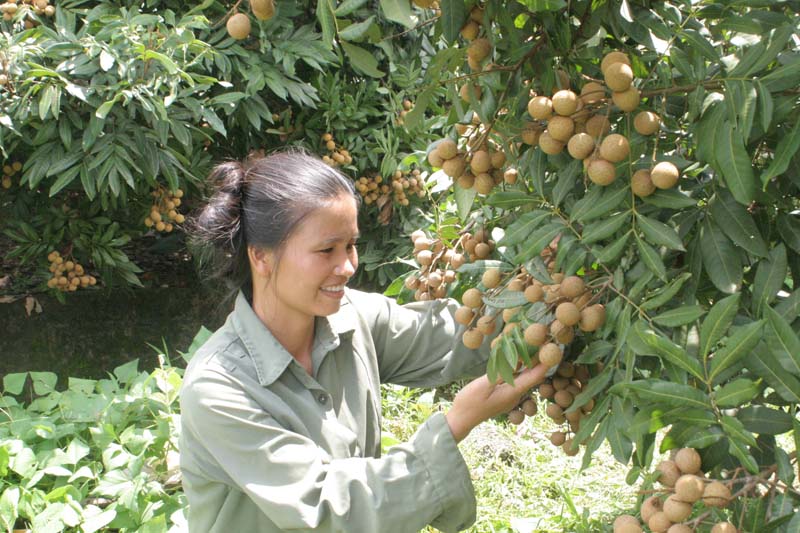
(HBO) – Kim Boi district has gained many important achievements over the half-term implementation of the Resolution of the district’s 22th Party Congress.

People in Khoang village, Son Thuy
commune, Kim Boi district have invested in longan farming to develop household business.
The district has mobilized different sources of funding to develop
local infrastructure, transfer technology and support people in scaling up
effective business models towards sustainable production closely linked with
distribution. Among the most successful are the farming of Thai jackfruit,
banana, gourd, baby cucumber and various varieties of rice.
At the same time, it has partnered with businesses and
organisations to develop a number of cooperative models, including an
84.7-hectare farm producing pumpkin for seeds, a 2.6-hectare farm of bitter
melon for seeds, 78.5 hectares of sweet corn, 15.3 hectares of Japanese
cucumber and 4 hectares of chili. This cooperation has opened up new opportunities
for farmers to shift to new plants suitable to the local conditions and
potential, hereby improving their income.
Life of people in the commune of 135 Thuong Bi region has
significantly improved thanks to efforts to diversify crops and expand new
farming models such as the cultivation of pumpkin for seeds, chili for export
and Thai jackfruit.
In recent years, Kim Boi has directed its communes to expand
citrus farming, particularly specialty varieties of orange and pomelo, like
yellow-flesh, V2 and sweet orange, Dien and green-skin pomelo, and Huong Chi
longan.
The district has formed specialized production areas. It is home
to 1,000 hectares of citrus farms, mostly in the communes of Kim Son, Tu Son,
Vinh Tien, Binh Son and My Hoa, and 230 hectares of longan farms in Son Thuy,
Thuong Bi and Bac Son communes. Some 200 hectares of pumpkin and bitter melon for
seeds and 500 hectares of gourd and pumpkin for commercial purposes have been
also developed in many communes./.
According to data from the Hoa Binh Provincial Party Committee, the industrial production index for the first six months of 2025 is estimated to have increased by 20% compared to the same period last year. This marks the highest year-on-year growth rate for this period since 2020.
In the first six months of 2025, Hoa Binh province’s export turnover was estimated at 1.145 billion USD, marking an 18.11% increase compared to the same period in 2024. Import turnover was estimated at $ 804 million, a 17.15% increase, which helped the province maintain a positive trade balance.
The lives of the ethnic minority farmers in Tan Lac district have gradually improved thanks to the new directions in agricultural production. This is a testament to the collective strength fostered through the professional associations and groups implemented by various levels of the district’s Farmers’ Union.
With the motto the "product quality comes first,” after nearly one year of establishment and operation, Muong village’s Clean Food Agricultural and Commercial Cooperative, located in Cau Hamlet, Hung Son Commune (Kim Boi district), has launched reputable, high-quality agricultural products to the market that are well-received by consumers. The products such as Muong village’s pork sausage, salt-cured chicken, and salt-cured pork hocks have gradually carved out a place in the market and they are on the path to obtaining the OCOP certification.
In the past, the phrase "bumper harvest, rock-bottom prices" was a familiar refrain for Vietnamese farmers engaged in fragmented, small-scale agriculture. But today, a new spirit is emerging across rural areas of Hoa Binh province - one of collaboration, organisation, and collective economic models that provide a stable foundation for production.
Maintaining growing area codes and packing facility codes in accordance with regulations is a mandatory requirement for agricultural products to be eligible for export. Recently, the Department of Agriculture and Environment of Hoa Binh province has intensified technical supervision of designated farming areas and packing facilities to safeguard the "green passport" that enables its products to access international markets.



